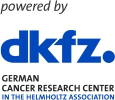Speaker
Description
Diacylglycerol kinases (DGKs), specifically DGK zeta (DGKζ) and DGK alpha (DGKα), are lipid kinases that regulate T-cell activation by modulating diacylglycerol (DAG) levels at the immunological synapse in a non-redundant fashion. T-cells deficient for DGKζ or DGKα are hyperresponsive and were shown to mediate enhanced immunity against viral infections and tumors. Further experimental evidence suggests that dual DGKα/ζ inhibition may result in maximal T-cell activation. We previously presented the discovery and pharmacology of the DGKζ-selective inhibitor BAY 2965501. In parallel, we developed the DGKα-selective inhibitor BAY2862789, and analyzed its impact on T-cell activation and anti-tumor immunity, both as single agent and in conjunction with DGKζ inhibition, PDL1-blockade and/or depletion of CCR8-positive T-regulatory cells. First-in-human clinical trials with selective DGK inhibitors are currently ongoing.
Both inhibitors enhance in vitro T-cell activation and T-cell mediated tumor cell killing. Pharmacological DGK-inhibition overcomes the suppressive impact of TGFβ and PGE2. T-cell enhancement is more pronounced upon combined DGK inhibition, especially in the context of weaker antigenic TCR-stimulation. Examination of anti-tumor efficacy in different syngeneic mouse models showed that for some tumors maximal effect can already be achieved by DGKζ inhibition alone, whereas for other tumors additional benefit is observed with combined inhibition. Using the available preclinical data, an exposure-response model was developed to predict the T-cell activation for various DGKα/ζ combinations. The predictions are highly correlated to corresponding in vivo efficacy endpoints, which demonstrates the relevance of this in vitro to in vivo extrapolation. The model offers the opportunity to identify optimal combination dosages that pair maximal enhancement of T-cell immunity with minimal probability for on- and off-target adverse events.
The availability of DGKζ and DGKα selective inhibitors allows for hypothesis-driven pharmacology and toxicology studies, and – in combination with the forthcoming single-agent patient exposure data - for a rationally designed dual-agent clinical study.
| Research type | Translational research |
|---|

